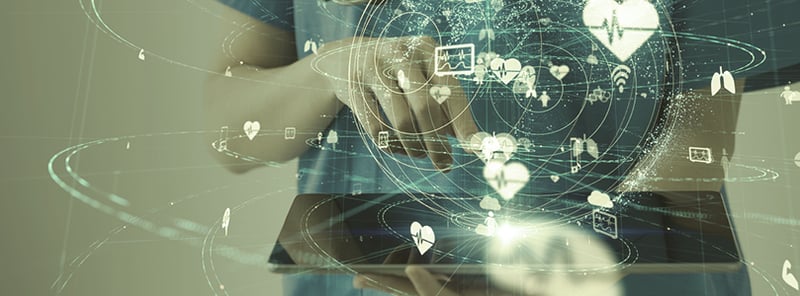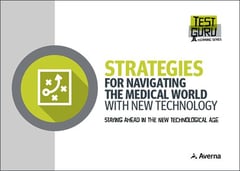
There aren’t many places where you can still find an active fax machine. Sadly, a doctor’s office is one of them. How is it that an industry so vital to mankind isn’t in the driver’s seat in innovation? At the end of the day, we can live without autonomous cars, video chatting and on-demand radio, but the one thing we cannot escape is our health. It is the most important thing to take care of and one would think technological advancements would start there.
But no, that’s not how it has been. This isn’t to say that the medical field was slacking, not at all. Consider how far we’ve come. Diseases are being cured, vaccines are being created…progress is definitely happening. We are lucky to live in a time where illnesses that were once a death sentence have been eradicated. So why has it taken so long for the MedTech industry to really get moving?
Life-Saving Progress is Already Out There
As it turns out, there are several reasons. Considering the impact healthcare has on every person’s life, safety, power consumption and compliance rules are much stricter to adhere to. Complain as we may, this was likely for the best at that time. Back in the day (15 years ago) any medical device that incorporated telemetry features like deep brain stimulation systems, insulin pumps or ventricular assist devices for example, needed to leverage custom protocols in order to exchange data with medical equipment or medical professionals.
But things are changing, and they are changing fast. As commercial technologies become more stable, consume less power and are readily available, medical device companies are relying more on technologies like BLE (Bluetooth Low Energy) for their telemetry features. With off-the-shelf connectivity technologies, the development cycle is faster and from a reliability and compliance point of view, BLE is a practical solution.
So now, the ball is rolling, and amazing changes are happening. Looking at pharmaceutical companies for instance, the medicine is no longer the only differentiator. Companies are developing smart injectors that can deliver real-time insight to medical professionals or automatically administer a precise dose of medicine when needed. Today, diabetics can monitor their blood sugar levels with a quick scan to their arm with their phone or get a notification when their levels are dropping... the days of repeatedly drawing blood from their fingers are over. Another huge breakthrough are microelectronic capsules that collect and share data regarding diseases and abnormalities in the GI tract. This is a pill that (much to the patients’ delight) can go where a traditional endoscope can’t reach and captures real-time measurements of what’s going on inside.
The Future of Medical Devices will Exceed our Wildest Dreams
What is most incredible about this field is what is next. Mankind is essentially built the same way, but each human being is not a replication of the next. We have our own state of normal within our own bodies, meaning one person’s version of healthy may not match the next person's. With wearable medical devices, healthcare is becoming individualised and personal. It is very uncommon to be screened for bigger healthcare issues if a personal doesn’t fit into a box. As an example, men of a certain age do not have their PSAs checked. If a man is 45 years old and there is no family history of prostate cancer, this test will never be performed. Only once symptoms increase enough to raise a flag will an individual potentially mention it to their doctor. In the case of prostate cancer, the main symptom is frequent urination. It is a simple symptom to neglect mentioning to a doctor because people say, ‘Well, this is just a part of getting older!’ Prostate cancer is completely curable, but if the symptoms are ignored for long enough, the cancer will spread. So, imagine owning a device that knows your body and recognises ‘your normal’. Dr. Eric Topol, founder and director of Scripps Research Translational Institute and professor at Scripps Research refers to this as Deep Learning. A device measures one’s individual health and will flag when an abnormality appears. This is not meant to diagnose or cure, it is meant to bring medical attention to what can easily be ignored.
MedDevice Safety Comes First
The thing is, like most information that is released, medical devices are rarely talked about in the media unless something bad happens. When is the last time you read the headline “Millions of people survived another day thanks to their pacemaker”? No. People are only exposed to negative news and easily develop a hesitation towards the technology because of it. Safety is the biggest challenge for commercial technologies in the medical field and as more RF telemetry connectivity features are incorporated into these devices, new medtech test and compliance strategies are required. Data needs to be accurate, privacy needs to be protected and most of all devices need to work. Consequently, many medical device makers are partnering with RF test experts to create and implement the appropriate test and compliance strategies at both the R&D and manufacturing stages. It is a question of letting the test experts focus on safety and quality so that the medical experts can focus on saving lives. Good plan.
Let’s Do This
We are at the tip of the iceberg now, with overflowing possibilities. It is a very exciting time for MedTech, and with the doors opening, it will simply be a matter of embracing it. Artificial intelligence, virtual reality and robotic surgery are other examples of great things coming that are more difficult to swallow (unlike a digital capsule) but man, imagine where they will take us. The key will be in their successful execution, which is what makes the growth in the Life Sciences test industry so reassuring. It’s all coming…it’s good to see it’s happening the right way.
To speak with a test & compliance consultant please visit Averna’s website.
Want to learn more about the medical industry?
Get in touch with our experts or navigate through our resource center.
Download this eBook to find out what changes the medical industry is facing and the best ways to stay ahead in this new technological age.

